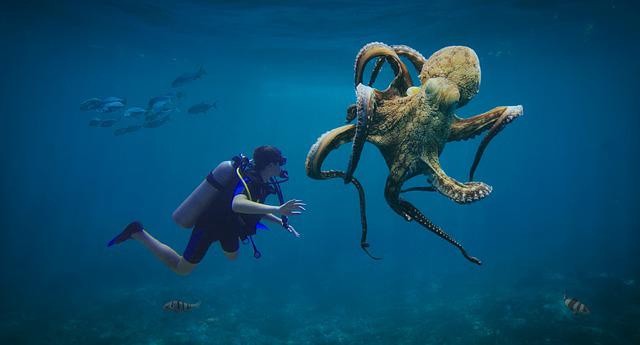
A new study concerning human and octopus DNA has revealed how both species have the jumping gene in their genetics. Most invertebrates are more intelligent and display human-like intelligence by a mile. This discovery points out an existing analogy that this cephalopod, in particular with humans.
Human and Octopus Evolutionary Similarities
As reported by Science Alert, two such different species are transposons that replicate and move about in the genetic material. These particular genes will be the raw material for evolutionary processes if they are not active. The new study says these genes are part of the Long Interspersed Nuclear Elements (LINE) family that has been found in cephalopod brains tasked with cognitive perception. It's in the same place in human brains.
Giovanna Ponte from the Stazione Zoologica Anton Dohrn research center in Italy characterized how, when observed under the microscope, a powerful signal of activity of this factor was seen in the vertical lobe, a part of the brain that, much like the human hippocampus, the seat of the octopus's cognition capabilities that is influenced by transposons.
Research has shown that LINE transposons a very controlled in the human brain that is connected to aspects of learning and memory present in human and octopus DNA. This is possible due to how they are most active in the hippocampus part that has governance of the learning process, according to Cell.
Read Also : DeepSqueak AI Revolutionizes the Study of Marine Animals Calls in the World's Oceans of Sounds
Cephalopod Species With the 'Jumping Genes'
Scientists have found that two cephalopod species have this specific characteristic in their brains, the common and Californian octopus, in particular. It could be why these specific members exhibit high intelligence compared to most marine animals.
These genetic components use molecular copy and paste and cut and paste processes that lead to more complexities in what is happening. It points to a possible direct relationship and how less simplistic a nervous system is, especially the brain, that needs more explanation.
Significance of the LINE Family
According to computational genomicist Remo Sanges, "It is important that an element from the LINE family has been found to be active in the brains of the two species of octopuses since it facilitates the presumption that these elements represent purposes other than simple copy-and-paste."
Furthermore, Consider that what we may be witnessing is a case of convergent evolution, which occurs if similar traits arise independently in species that are incidental to each other and end up serving the same adaptive role this case, outstanding cognitive skills.
More instances of evolutionary tricks and neurological responses make cephalopods seem superior despite being invertebrate animals; the sharing of the structure and responses of a mammalian brain is an exception.
Biologist Graziano Fiorito remarked that a cephalopod brain just works like a mammal brain. This is the reason why the LINE element is a standout candidate to understand how intelligence does evolve related to the study, noted BMC Biology.
Establishing that human and octopus DNA have the jumping gene called transposons involved in the evolution of intelligence is an important discovery.
Related Article: New Study Reveals Convergent Evolution Misleading, Says Evolutionary Tree Needs Revising
© 2025 HNGN, All rights reserved. Do not reproduce without permission.








